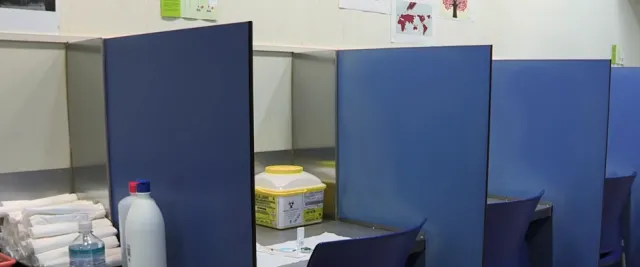My Health Diary - a school-based programme to enhance subjective well-being and health by strengthening emotional and social skills and parent-child relationships
At a glance
Country of origin
- Italy
My Health Diary is a school-based and teacher-led program focused on the active engagement of pupils and designed to enhance their subjective well-being and health by strengthening their emotional and social skills and by improving the parent-child relationship. The programme is based on a cascade training, so that health professionals specifically trained by the programme team, train teachers and organise courses for parents. It is composed of five standardised interactive lessons concerning common psychosocial and health issues in adolescence, and two narrative booklets addressed to both students and their parents.
Keywords
No dataLinks to this programme in other registries
Implementation Experiences
Read the experiences of people who have implemented this programme.Contact details
Franca Beccaria
Eclectica
Via Silvio Pellico, 1
10125 Torino [Italia]
www.eclectica.it
e-mail: beccaria[a]eclectica.it
Overview of results from the European studies
Studies overview
The effectiveness of the programme was evaluated by two separate trials published in two papers. The first trial (Allara 2019), although non randomised, is methodologically sound, but had some negative findings (reductions in subjective wellbeing) with outcomes in favour of the control group. This increased perception of psychosomatic complaints might be due to an increased emotional competence. However, the evaluation study concludes that “the programme in its present form should not be disseminated due to the possibility of adverse unintended effects”.
In a second randomized controlled trial (Ribaglietti et al., 2021), the program was not found to have significant effects on the primary outcome variables and most of the secondary variables. However, for the mediators, the association was stronger for the girls in the intervention group, and there was a statistically significant difference in the empathic skills shown by girls, who reported higher levels than boys.
Countries where evaluated
- Italy
Characteristics
Protective factor(s) addressed
- Individual and peers: Problem solving skills
- Individual and peers: prosocial behaviour
- Individual and peers: academic self-efficacy
- Individual and peers: positive self-concept and self-efficacy
Risk factor(s) addressed
- School and work: low commitment/attachment to school/workplace
Outcomes targeted
- Academic performance
- Emotional well-being
- Alcohol use
- Smoking (tobacco)
- Bullying
- Social behaviour (including conduct problems)
Description of programme
My Health Diary program aims to enhance the empathic and social abilities of pre-adolescents and their level of satisfaction with the school experience. This enhancement could increase their perception of psychological well-being and health status; and these aspects are intended to achieve an increase in pro-social behavior and academic success as well as a decrease of physical and verbal aggression, cigarette smoking, alcohol use, unhealthy eating habits and a sedentary lifestyle.
The rationale of My Health Diary is that providing students with the social and emotional skills to fulfill their potential and deal with common developmental tasks of adolescence (e.g.,
onset of puberty, identity development, increased responsibilities and academic demands) would result in improved well-being and health.
The part of the programme directly targeted at pre-adolescents consists in five standardised units based on interactive activities: My emotions; Beyond stereotypes; Becoming men & women; Managing my emotions; Others’ emotions. Each unit lasts between two to four hours, delivered by the teachers. After the first evaluation, two units were reviewed in order to focus more on the ability to manage emotions, while specific references to health-risk behaviors were removed. Most of the trained teachers (n = 130) implemented the programme during the second year of the Italian middle school to
students aged 12–13.
Implementation Experiences
Contact details
serena.faggian91[a]gmail.com
Main obstacles
With respect to individual professionals
Finding people to carry the project forward and the scarcity of resources at regional level.
With respect to social context
The lack of trainers.
With respect to organisational and economic context
The scarcity of trainers and limited economic resources.
How they overcame the obstacles
With respect to individual professionals
With a good teamwork of people actively involved in the programme.
With respect to social context
Holding fewer meetings and concentrating them more regionally.
With respect to organisational and economic context
Focusing on the school environment and existing personal resources.
Lessons learnt
With respect to individual professionals
The importance of active exchange between people, and of collaboration between them. The importance of emotional education is passed on in participatory ways, involving students and parents.
With respect to social context
The importance of lecturers trying out the programme they will propose to students. Their involvement promotes understanding and exchange.
With respect to organisational and economic context
The ability to cope with difficult situations by making the best use of available resources.
Strengths
Sharing emotions and creating collaboration.
Weaknesses
Resources - funds - spaces
Opportunities
Communication network
Threats
Maintaining continuity and lack of resources
Recommendations
With respect to individual professionals
Implement resources and make more annual training meetings, work in teams exchanging ideas and experiences on a continuous basis.
With respect to social context
Make the project widespread and create continuous feedback with families and schools.
With respect to organisational and economic context
Create intervention networks in agreement with regional and local institutions. Organize events to raise funds.
Note from the authors
Implemented in 2018.
Number of implementations
Country
Contact details
lidiaruella[a]libero.it
Main obstacles
With respect to individual professionals
The project involved the pupils throughout the school year while the training was only carried out at the beginning of the course. The practice in the classes brought to light, also considering the strictly individual and personal theme, different and sometimes delicate situations, not easy to deal with by teachers who, for their training, do not always have adequate psychological and pedagogical skills.
With respect to social context
Fortunately, the social context in which I operate has favoured and supported the implementation of the programme effectively. In particular, the context was characterized by a small-medium school in the province, which for years has been experimenting with teaching supported and supported by technological tools that both teachers and students know how to use. There are no situations of serious discomfort or abandonment. The cultural context, on the other hand, has influenced the programme, especially with regard to a certain difficulty, even among adults, in relating and managing emotions publicly.
With respect to organisational and economic context
Surely the greatest obstacles in this respect do not come from the implementation of the programme in schools, requiring them no financial outlay. the greatest difficulties are certainly to be found in the organisation and initial management of the funds to support the programme. However, this is not my area. On the organisational level, however, it is certainly difficult for all social actors to interact and collaborate: operators, managers, teachers, parents, pupils.
How they overcame the obstacles
With respect to individual professionals
This obstacle has been overcome thanks to the full availability and constant collaboration between teachers and expert trainers.
With respect to social context
Although there were no serious problems with the social context, cultural difficulties were mainly addressed by inviting the pupils to a sincere and open dialogue both with the teacher and with their classmates. When "talking about emotions" became a practice carried out by the whole class context, the problems in this regard were considered absolutely resolved.
With respect to organisational and economic context
A constant dialogue and collaboration was sought between the actors and the various institutions involved.
Lessons learnt
With respect to individual professionals
In order to best implement the programme, it would be useful to provide continuous support and support to monitor the growth path of the children and to solve any individual emotional problems that may arise within the class. For teachers, the support of professionals, not only at the beginning but also during the course, is of fundamental importance to ensure the correct and effective implementation of the programme.
With respect to social context
Difficulties in implementation are given not only by the social context, but also by the cultural context, especially in those areas where, as a matter of habit, very often even at home, certain discourses and personal issues are not dealt with. In these contexts the implementation of the programme is important because it allows you to involve parents as well and if this happens, the activity becomes really meaningful for everyone (pupils, teachers, parents).
With respect to organisational and economic context
In order to implement the programme significantly, not only pupils and teachers, but also all intermediate subjects need to be involved.
Strengths
commitment shown by pupils and teachers,
support of professionals and trainers,
constant relationship with operators and trainers
Weaknesses
dialogue between all the actors involved,
dissemination according to privacy regulations,
sharing the material produced by pupils and teachers
Opportunities
Extension of the program not only to be carried out in one year, but following the path of growth during the three years of the Secondary School of First Grade
Increased support and involvement of the families involved
Threats
Difficulties in the day-to-day management of classroom activities
More difficulties in collecting and disseminating results over a longer period of time
Recommendations
With respect to individual professionals
Training, supervision, creation of a solid and widespread collaborative network
With respect to social context
Always take into account the social and cultural background in order to be able to adapt the programme to individual local realities, that are often different from each other.
With respect to organisational and economic context
Involve all professional stakeholders and institutions involved in the programme. Provide adequate financial support to the programme that involves and commits the practitioners in a serious and constant way.
Note from the authors
Implemented in 2019.












